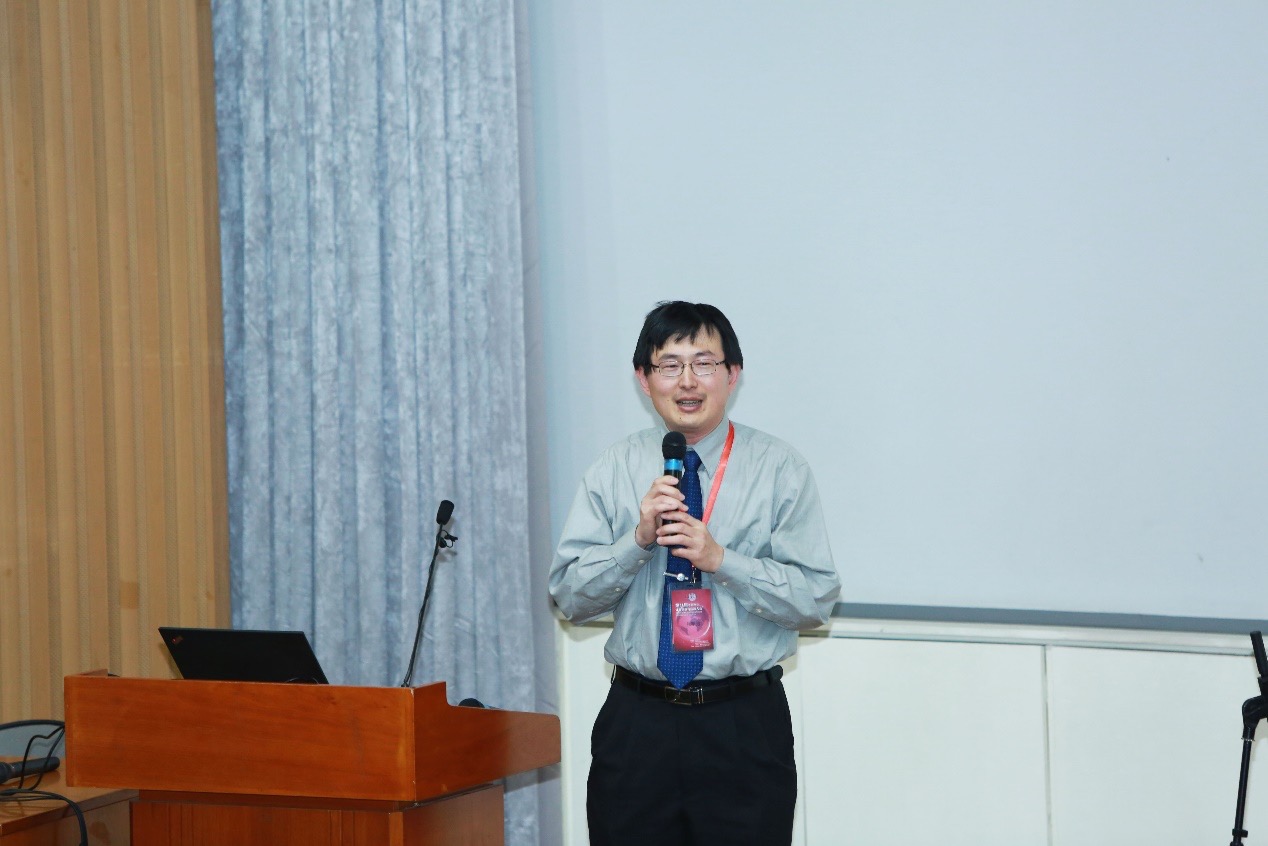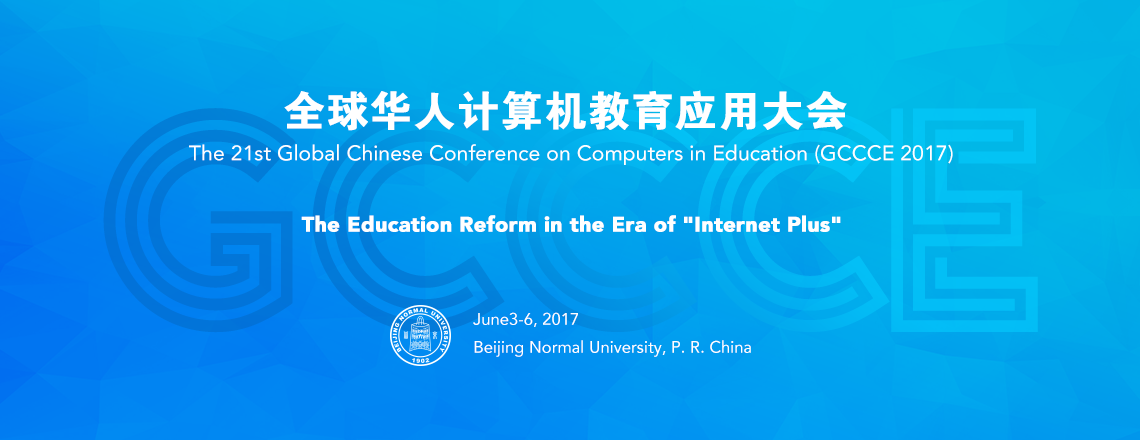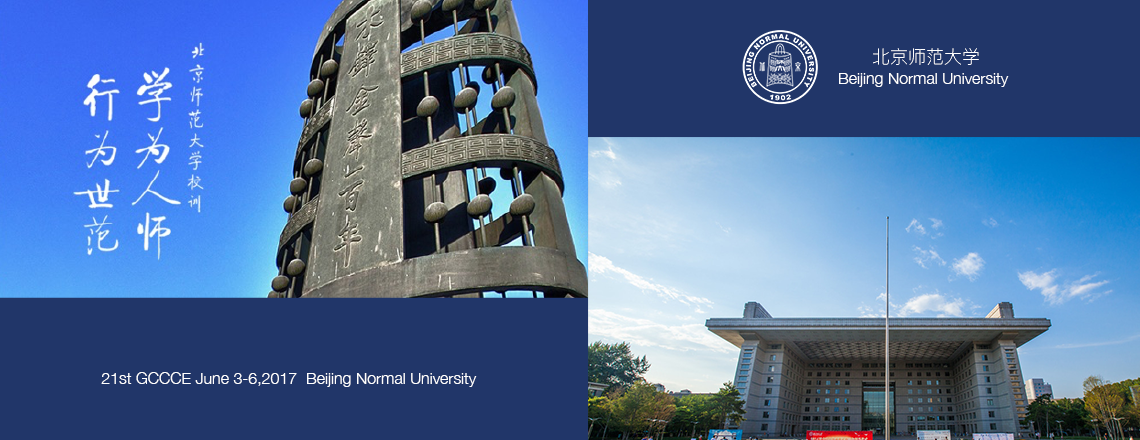
The 21st Global Chinese Conference on Computers in Education (GCCCE 2017) Successfully Held at Beijing Normal University
On the afternoon of June 4, 2017, the 21st Global Chinese Conference on Computers in Education (GCCCE 2017) began at Beijing Normal University. The conference was hosted by Beijing Normal University and co-organized by the School of Education Technology of the Faculty of Education and the Advanced Innovation Center for Future Education (AICFE)—as well as the Joint Laboratory for Mobile Learning, Ministry of Education- China Mobile Communications Corporation. The conference was attended by more than a dozen media outlets such as China Science Daily, Science and Technology Daily, Modern Education News, E-education Research, Open Education Research, Modern Educational Technology, Modern Distance Education Research, Distance Education Journal, China Educational Technology, Distance Education in China, NetEase and Tencent Education.

At the conference
Global Chinese Conference on Computers in Education (GCCCE) is an annual international academic conference which has now been held successfully for 21 years. Organized by the Global Chinese Society for Computers in Education, the conference has been developed into a premier academic event for researchers, policy makers, and stake holders in Chinese communities for the worldwide dissemination and sharing of ideas regarding research in the field of Computers in Education. The theme of this recent conference is "Education Reform in the Era of 'Internet Plus,'" which includes nine topics: Learning Science and Computer Supported Collaborative Learning; Digital Classrooms—Mobile and Ubiquitous Learning; Joyful Learning and Society; Technology in Higher Education and Human Performance; Teacher Professional Development and Educational Policy; Technology-Enhanced Language Learning; Learning Analysis, Assessment, and Artificial Intelligence in Education; Maker and STEM Education; and Digital Technology, Innovation, and Education. For each topic there was a chairman, a vice chairman and a committee. The conference solicited contributions from Chinese researchers globally, and received a total of 551 papers submitted from mainland China, Taiwan, Hong Kong, Macao, Singapore, the United States, Canada and other countries and regions.

Prof. Xudong Zhu, Dean of the Faculty of Education, Beijing Normal University

Prof. Li Chen, Vice President of Beijing Normal University
During the opening session, Prof. Xudong Zhu, Dean of the Faculty of Education at Beijing Normal University hosted the opening ceremony. On behalf of the faculty, staff, and students of Beijing Normal University, Prof. Li Chen, Vice President of Beijing Normal University, made an opening speech to express her gratitude to the experts and research teams from around the world. Prof. Li Chen believed the development of information technology has shown signs of transforming from enhancement technology to revolutionary technology; and the informatization of education has also emerged from its early stage and entered into the integration and innovation stages. These changes are affecting all aspects of education. In an era when opportunities and challenges coexist, we are building a series of research platforms to bring together talented researchers and educators, continue to innovate, strive to solve educational problems, and promote education reform and development.

Prof. Tak-Wai CHAN, National Central University, Taiwan
Then Prof. Tak-Wai CHAN from National Central University, Taiwan who is the Chairman of this conference, gave an opening speech. Prof. Chan believes we are now at a turning point historically. He hoped all his peers could take Prof. Kekang He and other senior educators as models and become lifelong researchers who would carry forward their virtues and become leaders of the global Chinese community within the field of applied computer science.

Zhuzhu Wang, Curator of the National Center for Educational Technology
Ms. Zhuzhu Wang, Curator of the National Center for Educational Technology, expressed her congratulations and exceptions for this conference. Based on the 13th Five-Year Plan of Educational Informatization, she put forward her hopes that all experts can work together for informatization with Chinese characteristics, and that the global Chinese community can work together for the academic and educational development in China.

Prof. Zhiting Zhu, East China Normal University
Prof. Zhiting Zhu from East China Normal University interpreted the educational informatization trend optimistically, believing the reform of education needs support of external forces as well as the power of thinking. As education is an integration of science, technology, art and humanity, we should expand our horizons to carry out relevant and worthwhile research. He hoped the global Chinese community will work together to integrate our wisdom, tradition and modern science and technology to create achievements capable of international influence.

Prof. Maiga Chang, Athabasca University, Canada
Prof. Maiga Chnag from Athabasca University, Canada, and Chairman of the International Program Committee briefly introduced the collection and review process of the papers submitted, and thanked all for their assistance and participation. He hoped that everyone would gain additional knowledge and insight from this conference.

Prof. Shengquan Yu
Prof. Shengquan Yu, on behalf of the conference local organization team, presented the final speech to express his gratitude for everyone's support and cooperation. He hoped the conference could provide a platform for mutual exchange and cooperation, especially to enhance mutual understanding and long-term cooperation within the global Chinese community.

Prof. Kekang He
After the opening ceremony of the conference, Prof. Kekang He from Beijing Normal University delivered a keynote speech entitled “Maker Education and Innovative Talents Development—Establishing the System of Maker Education with Chinese Characteristics”. Firstly, he analyzed and compared the commonalities and differences between Chinese and Western Maker Education. He then expressed his hope that we establish a Maker Education system with Chinese characteristics and accelerate the construction of intelligent campuses based on big data, which would provide favorable conditions for the integration of Maker Education with existing education.

Prof. Carolyn Rosé, Carnegie Mellon University
The conference was held from June 4th to 6th. In addition to the opening ceremony, the conference also included keynote speeches, paper reports, a workshop forum, a doctoral student forum, a primary and secondary school teachers’ forum, and other platforms for discussion. On the morning of June 5, Carolyn Rosé, Prof. of the Language Technologies Institute and Human-Computer Interaction in the School of the Computer Science at Carnegie Mellon University, delivered a keynote speech entitled “Creating Sociotechnical Affordances for Highly Effective Team-Based Learning in Online Education”. This talk reports on research working towards persistent social interaction throughout large online courses in the form of technology-supported team based projects. In particular, her team proposes what we refer to as a deliberation-based team formation procedure to improve the selection and initiation process used to start team-based learning in an effective way. At the same time, she discussed the prospects of online learning groups.

Dr. Lung-Hsiang Wong, Senior Research Scientist , Nanyang Technological University, Singapore
On the afternoon of June 5, Dr. Lung-Hsiang Wong is currently a Senior Research Scientist of the Learning Sciences Lab at the National Institute of Education, Nanyang Technological University, Singapore, gave a lecture entitled "Between ‘Dream-making’ and ‘Down-to-Earth’: Towards cross-fertilization of diversified research directions in the learning technology field" Dr. Lung-Hsiang Wong 's team has categorized various research orientations of educational technology. Based on the TPACK framework, the team explores and compares the typical sources of research inspiration, the purpose of research, research methods as well as other areas. The team created a case study of the development progress of its two mobile assistive projects for language learning—"Chinese-PP!" and "MyCLOUD"—to discuss how to achieve mutual understanding and work toward the complementary collaboration of teaching practitioners and educational technology scholars with different orientations.

Prof. Nian-Shing Chen, National Sun Yat-sen University, Taiwan
On the morning of June 6th, Prof. Nian-Shing Chen, Department of Information Management at National Sun Yat-sen University in Taiwan, made a keynote speech entitled "Flipped Classroom Teaching and Learner Autonomy." He described the concepts, designs and implementation strategies of flipping courses. First, he explained the significance of the two parts of the course: pre-recorded interactive video lectures and highly interactive learning activities. In addition, he also mentioned teachers can teach in six different types of venues, including physical classrooms, asynchronous cyber classrooms, synchronous cyber classrooms, mobile classrooms, social classrooms and ubiquitous classrooms. In the implementation phase, he proposed a four-stage systematic approach to help teachers to effectively conduct an flipping course. These four stages are designing learning content, leading learning activity, guiding students with specific learning difficulties, and managing good learning atmosphere across multiple learning spaces.

Dr. Qifeng Zhu, the chief scientist and chirman of Arivoc International Education Group
On the afternoon of June 6, Dr. Qifeng Zhu, the chief scientist and chirman of Arivoc International Education Group and the founder of the Beijing Competency Research Institute, gave a keynote speech entitled "The Practice and Future of Artificial Intelligence, Intelligent Learning Space and Educational Informatization." In his speech, he reviewed the global educational informatization movement, including the rapid changes in China's educational informatization in the past couple of decades. He pointed out that educational informatization has entered a new stage of development. Prof. Qifeng Zhu combined the development process of Arivoc International Education Group in China's thousands of primary and secondary schools with three national empirical research reports to introduce the application of artificial intelligence technology in English classroom teaching, homework, listening and speaking tests and other aspects, and the development level of related technology in the world.

Prof. Shaoqing Guo, Northwest Normal University
In addition, Prof. Shaoqing Guo of Northwest Normal University made a keynote speech entitled "Research on the Model of Online Teacher Professional Development Community" at the primary and secondary school teachers’ forum. First, he described the development of teacher training in Northwest Normal University, which underwent initial analysis and systematic training before the final application. On the basis of these large-scale practices, he proposed an iterative model that combines school-based training, school-based practice and centralized training with mixed training and network research to form a comprehensive training for the effective integration of different training types.
In addition to the keynote speeches, a total of 10 group reports were presented at the teacher forums and 22 group reports were presented at workshops during the conference. The 5 groups of reports include the doctoral forum’s "From the Past 20 Years to See the Future 20 Years of GCCCE," the internal forum’s "Doctoral Study Survival Rules" workshop, and 2 groups from the primary and secondary school teachers’ forum, "Experience in Person; If It's Good, Apply It" workshop.

Workshop forum: The lecturer responding to audience questions

Group Photo of the Doctoral Forum

"Doctoral Study Survival Rules" Workshop Forum

Primary and Secondary School Teachers’ Forum: Linghong Du, Advanced Innovation Center for Future Education, introducing the Smart Learning Partner
On the afternoon of June 6th, a closing ceremony was held. First, there was a review of the conference’s highlights through video clips, and then the Chairman of the Conference, Prof. Tak-Wai CHAN, made a closing speech, hoping the conference will continue to serve as a platform for high-level academic research and practice while still selecting papers according to high standards. He also hoped to attract more international experts and scholars to participate, and encouraged more young scholars to join this platform. Prof. Shengquan Yu, Chairman of the Organizing Committee, thanked the teachers for their participation and impressive speeches, and thanked the Chairman of the conference and the chairman of each meeting as well as the team members for their excellent contributions. Subsequently, prizes were awarded at the award ceremony, including the Best Student Paper Award, Best Technical Design Paper Award, Best Teacher Forum Paper Award, and Best Research Paper Award.
GCCCE 2018 will be held in South China Normal University, and Prof. Youru Xie of this university introduced GCCCE 2018. Finally, Prof. Shengquan Yu of Beijing Normal University handed the seal of the conference to Prof. Youru Xie. The 21st Global Chinese Conference on Computers in Education (GCCCE 2017) came to an end.
We believe all participants shared their achievements and ideas in this conference. The conference gathered the wisdom of experts and scholars at home and abroad for the construction of educational informatization with Chinese characteristics, and promoted the long-term development of applied computer science in education globally.

Prof. Tak-Wai CHAN, National Central University, Taiwan, delivering a closing speech

Prof. Shengquan Yu, Beijing Normal University giving a tribute

Group photo of several prize winners

Prof. Youru Xie, South China Normal University

Prof. Shengquan Yu, Beijing Normal University, handing the seal of the conference to Prof. Youru Xie, South China Normal University

Group photo of participants



